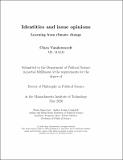| dc.contributor.advisor | Andrea Louise Campbell. | en_US |
| dc.contributor.author | Vandeweerdt, Clara. | en_US |
| dc.contributor.other | Massachusetts Institute of Technology. Department of Political Science. | en_US |
| dc.date.accessioned | 2020-11-24T17:32:05Z | |
| dc.date.available | 2020-11-24T17:32:05Z | |
| dc.date.copyright | 2020 | en_US |
| dc.date.issued | 2020 | en_US |
| dc.identifier.uri | https://hdl.handle.net/1721.1/128631 | |
| dc.description | Thesis: Ph. D., Massachusetts Institute of Technology, Department of Political Science, May, 2020 | en_US |
| dc.description | Cataloged from student-submitted PDF version of thesis. | en_US |
| dc.description | Includes bibliographical references (pages 115-128). | en_US |
| dc.description.abstract | In this dissertation, I explore the formation of issue-specific opinions, in particular public opinion about climate change in the United States. More specifically, I analyze whether people use social groups and identities as mental "shortcuts" in order to form an opinion about complicated political topics such as climate change. I study three identity-related factors that may drive people's opinions about particular issues: partisan media content; the interests of social in-groups; and opinion cues from fellow partisans. Overall, I find that partisan identities are likely to have important effects through the media content that they expose Americans to. Other, more direct pathways for the opinion effects of identity, however, turn out to be surprisingly weak. I find no evidence that Americans' opinions are motivated by the material interests of their in-groups; nor that Americans change their opinions to align with the consensus among their in-party members. | en_US |
| dc.description.abstract | In chapter 2, I ask what strategies partisan media use to fit real-world events into ideological narratives. I look at whether or not they connect events to related political issues (e.g. hurricanes and climate change), and whether each side is able to fit events into its existing set of issue positions. Using natural language processing and crowd-sourcing, I analyze almost 2 million hours of radio from hundreds of talk shows. I find that in the aftermath of an event, both ideological sides give far more attention to related political issues. At the same time, there are huge gaps between the positions that liberal and conservative shows tend to take on those issues, and events they do very little to close those gaps. Events turn up the volume of the discussion, without changing its ideological tune. This way, shared experiences could be turned into polarizing factors. | en_US |
| dc.description.abstract | Next, in chapter 3, I investigate whether people change their attitudes about societal issues when they learn that those issues affect others like them. In three pre-registered survey experiments, I find that these in-group interest cues have little to no effect on issue-specific attitudes. This is true for social groups based on gender, race/ethnicity, and sexual orientation. People who closely identify with an in-group do not react more strongly to the group interest information. The findings raise new questions about exactly when and why people's group memberships in uence their political attitudes. Finally, in chapter 4, I ask whether people change their opinion when they learn the distribution of opinions among members of their own party (or of the out-party). I also compare the effect of these "mass cues" to the effect of elite cues information about politicians and their stances on an issue. | en_US |
| dc.description.abstract | I run two preregistered survey experiments one national, and one on an Amazon Mechanical Turk convenience sample and draw two unexpected conclusions. First, I find that mass cues have no noticeable effect on opinions. When participants learn that a stance is shared by almost all members of their in-party, they do not move their own opinion closer that stance. Neither are they affected by learning about consensus among the out-party. Second, I am unable to replicate the well-established effect of elite cues. Combined with a closer inspection of the literature on cues, these findings suggests that cueing effects might be quite context-dependent | en_US |
| dc.description.statementofresponsibility | by Clara Vandeweerdt. | en_US |
| dc.format.extent | 128 pages | en_US |
| dc.language.iso | eng | en_US |
| dc.publisher | Massachusetts Institute of Technology | en_US |
| dc.rights | MIT theses may be protected by copyright. Please reuse MIT thesis content according to the MIT Libraries Permissions Policy, which is available through the URL provided. | en_US |
| dc.rights.uri | http://dspace.mit.edu/handle/1721.1/7582 | en_US |
| dc.subject | Political Science. | en_US |
| dc.title | Identities and issue opinions : learning from climate change | en_US |
| dc.type | Thesis | en_US |
| dc.description.degree | Ph. D. | en_US |
| dc.contributor.department | Massachusetts Institute of Technology. Department of Political Science | en_US |
| dc.identifier.oclc | 1221003351 | en_US |
| dc.description.collection | Ph.D. Massachusetts Institute of Technology, Department of Political Science | en_US |
| dspace.imported | 2020-11-24T17:32:04Z | en_US |
| mit.thesis.degree | Doctoral | en_US |
| mit.thesis.department | PoliSci | en_US |
